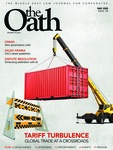DLA Piper advises on key enforcement decision in KSA
The decision follows the passing of two separate laws in the Kingdom, which have brought the arbitration and enforcement regime in the Saudi courts more closely in line with international standards.
DLA Piper’s Litigation, Arbitration & Investigations team has advised a telecommunications company in an ICC arbitration that has resulted in a landmark enforcement decision in the Kingdom of Saudi Arabia, according to a statement released by the firm. The decision follows the passing of two separate laws in the Kingdom, which have brought the arbitration and enforcement regime in the Saudi courts more closely in line with international standards.
In the recent arbitration, the Enforcement Court in Riyadh has confirmed that a USD 18.5 million ICC award, rendered in London, will be enforced in the Kingdom against a Saudi-domiciled award debtor. The enforcement process took just three months before the Enforcement Court.
The decision to enforce this major foreign award, in addition to the relative speed with which the decision was reached, is cited to be a significant development in arbitration in the Middle East. Whilst foreign arbitral awards have been recognised and enforced in Saudi Arabia sporadically in the past, the process has generally been a tortuous one, stated the release. The decision marks the first practical example of recognition and enforcement of a foreign award since the promulgation of the Kingdom’s new arbitration and enforcement laws. Riyadh-based partner Amer Al Amr, that led the DLA Piper team.
Henry Quinlan, head of Litigation, Arbitration & Investigations, Middle East said, “The enforcement landscape across the Middle East is rapidly changing, not just in Saudi Arabia but more broadly across the GCC. In the UAE, for example, we’ve recently seen a series of landmark judgments from the DIFC Courts which open up wider routes for the enforcement of foreign court judgments and arbitral awards than has traditionally been the case. We look forward to seeing more pro-arbitration decisions over the coming twelve months as governments seek to encourage foreign investment and diversify their economies.”

























































































































